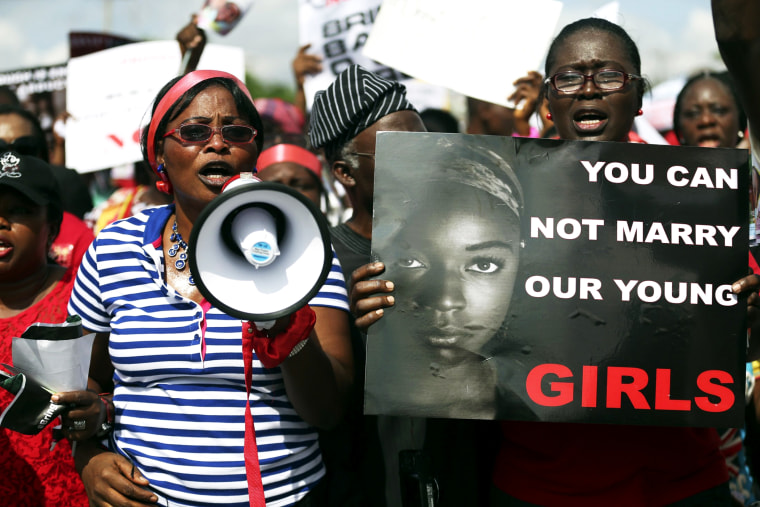The 20 women who serve in the U.S. Senate called on President Obama and the international community on Tuesday to respond quickly to what the lawmakers called "appalling actions" in Nigeria, where nearly 300 schoolgirls were kidnapped three weeks ago.
The Islamist militant group Boko Haram claimed responsibility earlier this week for the kidnapping. The group has threatened to "sell" the young women on the market.
"We condemn these appalling actions in the strongest possible terms, and we agree with you that the abduction of these girls is an outrage," the senators wrote in a letter to the president. They also urged the international community to crack down on the terrorist organization, including placing Boko Haram on the United Nation's al-Qaeda sanctions list.
"Their addition to the List would compel a greater number of countries to sanction Boko Haram, joining several countries, including the United States, which have already done so," the letter said. Sens. Barbara Mikulski, a Democrat from Maryland, and Susan Collins, a Republican from Maine, organized the letter.
First lady Michele Obama also joined the global outcry Wednesday, posting a photo featuring the hashtag "Bring Back Our Girls."
Boko Haram translates to "Western education is forbidden," and the group previously engaged in attacks on Western individuals, according to the National Counterterrorism Center.
The suspected kidnappers took the girls from their dormitories at a school in Chibok, Nigeria and drove away with them in trucks during the middle of the night.
Secretary of State John Kerry on Tuesday offered immediate aid to Nigerian President Goodluck Jonathan in the search for the missing girls. The Nigerian president accepted Kerry's pitch on the same day the militant group allegedly abducted eight more girls from Africa's most populous nation.
There are currently between 70 and 80 U.S. military personnel stationed in Nigeria, according to NBC News. An additional 10 uniformed members will travel to Nigeria soon, Col. Steve Warren, a Pentagon spokesperson, said Wednesday. The group, composed of individuals from U.S. Africa Command Headquarters in Germany, will assist Nigerian leaders in their search efforts.
The United States, however, "is not considering an operation to rescue the girls," Warren added. The additional individuals will act only as advisers.
The U.S. ambassador to Nigeria planned to meet with the African country's national security adviser on Wednesday to discuss coordination of the assistance provided by the United States. Additionally, the U.S. Agency for International Development began to prepare to help families of the missing girls.
Kerry said that U.S. officials have been in touch with Nigerian leaders since the first day the kidnappings occurred, but "the complications that have arisen convinced everybody that there needs to be a greater effort."
The U.S. Senate also officially condemned the abduction of the girls. A group of lawmakers, including House Minority Leader Nancy Pelosi and Sen. Tim Scott of South Carolina, on Tuesday gathered outside the Capitol to take part in a moment of silence for the victims.
"While we applaud the initial U.S. condemnation of the kidnapping, we believe there is much more that the United States government should do to make clear that such an attack will not be tolerated," they wrote.
Additionally, UK Prime Minister David Cameron on Wednesday expressed shock over the kidnappings and agreed with Obama that the international community must work together and act against the group. President Jonathan accepted Cameron's offer of assistance, thus establishing a small team of experts to complement the U.S. advisers.
Democratic Sen. Dianne Feinstein of California said she supported the United States' action in Nigeria.
"Sending U.S. experts to Nigeria to help locate the kidnapped schoolgirls is just the first step. I would support whatever actions are necessary to locate, capture, and eliminate the terrorists responsible for this reprehensible act," she said in a statement on Wednesday. "I support sharing with Nigeria and others whatever intelligence is necessary to help bring these kidnappers to justice."
